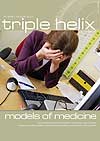'Could kindness heal the NHS?'
This moving Personal View by portfolio GP Angela Jones is about lack of caring in the NHS: 'I regularly treat acutely unwell elderly patients in need of hospitalisation who beg me not to send them in. I know sensible people who have given up going to their general practice, disillusioned by doctors who seem to be more interested in their computer than in them.' She contrasts evidenced and anecdotal experience with the values espoused in the NHS Constitution, and recommends 'abstaining from unkindness'.
(BMJ 2010;340:c3166)
Sick and (not) tired
A Royal College of Physicians study has found a link between introducing rotas compliant with a 48-hour week and rising rates of sick leave among junior doctors. In the year before implementation of the EWTD more than one in three took sick leave; in the year after, nearly three in four took time off. Although causation cannot be proved, the College comments that changes resulting from EWTD implementation may have led to a breakdown of the traditional medical team which offered much support to trainees.
(BMJ Careers 10 April 2010; GP112)
Dying for a child?
The world's oldest mother is dying, in India, just 18 months after giving birth at the age of 70, too weak to recover from complications after her IVF pregnancy. Rajo Devi Lohan gave birth in November 2008 but is now confined to bed and so frail she cannot lift her little girl. 'I dreamed about having a child all my life. It does not matter to me that I am ill, because at least I lived long enough to become a mother.'
(Daily Mail online 15 June 2010 tinyurl.com/3yymmjw)
Belgian nurses killing patients without consent
Belgium's law on euthanasia allows only physicians to perform the act. An investigation of nurses' involvement in the decisionmaking and the preparation and administration of life-ending drugs showed that nurses illegally administered lethal drugs, often without an explicit request from the patient. The authors somewhat euphemistically conclude: '…the nurses in our study operated beyond the legal margins of their profession'.
(Canadian Medical Association Journal, 15 June 2010 www.cmaj.ca/cgi/content/abstract/182/9/905)
Investing in saving life
CMF member Will Sellar had an interesting comparison published about the 2009 abortion statistics: 'There were 189,100 terminations of pregnancy in 2009… In the same period there were around 3,000 road deaths. The government spends about £36m per annum on road safety education and a further £135m on road safety schemes – around £1m per 20 deaths. I wonder how much is spent by government to reduce the annual abortion carnage in this country that is more than 63 times greater than that from road deaths?'
(BMA News 19 June 2010: 8)
Days numbered for homoeopathy?
Before the General Election, the outgoing House of Commons Science and Technology Committee urged in a report that the NHS should cease funding homoeopathy and that the Medicines and Healthcare products Regulatory Agency (MHRA) should not allow homoeopathic product labels to make claims without evidence of efficacy. They further concluded that, not being medicines, homoeopathic products should no longer be licensed by the MHRA.
(Science and Technology Committee Report 22 February 2010)
Educators cautioned re homosexuality
The American College of Pediatricians (a Christian group) has cautioned US educators about managing students experiencing same sex attraction or showing symptoms of gender confusion: 'it is not uncommon for adolescents to experience transient confusion about their sexual orientation…most students will ultimately adopt a heterosexual orientation if not otherwise encouraged'. They warn against affirming 'non-heterosexual attractions among students who may merely be experimenting or experiencing temporary sexual confusion'.
(www.americancollegeofpediatricians.org)
Inspired by an elective
Bristol student Tom Fox spent his medical elective in Papua New Guinea. 'My supervisor was Sister Joseph, a Catholic nun from Manchester who trained as a vascular surgeon in London…Sister Joseph was an inspiration, and no surgery appeared to be too challenging for her. In theatre she kept us entertained with her tales of practising medicine while wearing a habit…The scale of the health problems in the country is huge, although Sister Joseph shows that one person certainly can make a difference.'
(BMA News 19 June 2010: 6-7)
'Near death' experiences – CO2 the cause?
It is thought up to a quarter of cardiac arrest patients have experienced sensations such as seeing a tunnel or bright light, a mystical entity, or looking down from the ceiling in an 'out of body' experience. Others describe a simple but overwhelming feeling of peace and tranquillity. Eutychus has heard these presented as evidence for eternal life, but in a study of 52 cardiac arrest patients 11 who had such experiences were found to have significantly higher blood CO2 levels. Previous research has shown that inhaling CO2 can induce hallucinatory experiences. Historic and personal evidence for the resurrection of Jesus Christ is a much better basis for belief.
(http://news.bbc.co.uk/1/hi/health/8607660.stm)
What do you call a Scouser who…
is overweight? Liverpool City Council is formally considering banning use of the word 'obesity' from its health campaigns because of concerns it might offend the overweight. Apparently the 'Liverpool Schools Parliament' thought the word 'obesity' had negative connotations.
(Christian Research Quadrant, 2010; May:2)































